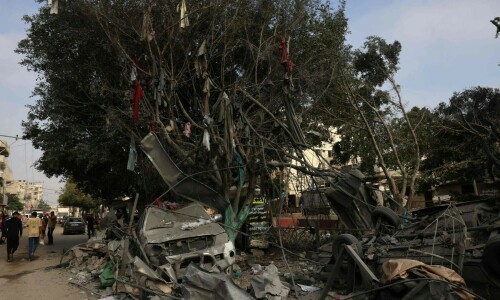The devastating humanitarian impact of the ongoing war on Gaza, which the International Court of Justice recently declared a genocide, has attracted global attention.
Notwithstanding, underneath the prompt human misfortune lies a less noticeable, yet similarly disturbing emergency: the methodical annihilation of Gaza’s actual climate and its biological system. This natural calamity, which a few specialists are naming ‘ecocide’, takes steps to have durable results that reach out a long ways past the ongoing struggle, influencing the district’s biology, general wellbeing, and future livability. Besides, this ecological obliteration essentially sabotages the human poise of Gaza’s inhabitants, denying them of their fundamental freedoms to a perfect and sound climate.
Beyond the immediate devastation of flora and fauna, the conflict has had an impact on the ecosystem of Gaza. The destruction of habitats and disruptions to food chains pose serious threats to the biodiversity of the region. Wildlife in the area suffer greatly from the loss of vegetation, particularly trees. Small mammals and birds that needed shelter and food from these trees may have had to migrate or face extinction. Additionally, Gaza’s marine ecosystem is in danger from pollution runoff and military operations’ destruction of coastal areas and marine habitats, threatening biodiversity and livelihoods.
The landscape could be altered irreversibly as a result of widespread destruction and the possibility of future plans for urban development. It’s possible that the contamination of the soil and water resources will last for years, making it difficult to get clean drinking water and grow crops in the future. The deficiency of arable land because of contamination, disintegration, and potential salinisation could have extreme ramifications for food security in a district previously wrestling with asset shortage.
Deforestation presents another basic ecological test. There are a number of ways that trees are being cut down, including the famous olive groves in Gaza. Vast swaths of vegetation have been destroyed by direct bombing and fire damage. Not only does this deforestation disrupt local ecosystems, but it also makes problems with desertification and soil erosion worse, making large areas potentially unsuitable for habitation or agriculture in the future.
A growing public health emergency is closely linked to the environmental disaster in Gaza.
The natural debasement in Gaza is multi-layered, enveloping issues going from water tainting to deforestation. One of the most squeezing concerns is the pollution of water sources. The extensive bombardment has caused damage to the water infrastructure, which has resulted in the mixing of sewage and supplies of potable water. Most of the water that is available is contaminated, making it unsuitable for human consumption, cooking, and basic hygiene practices. The demise of waste management systems has worsened the situation, resulting in the accumulation of a variety of waste, including hazardous medical waste.



